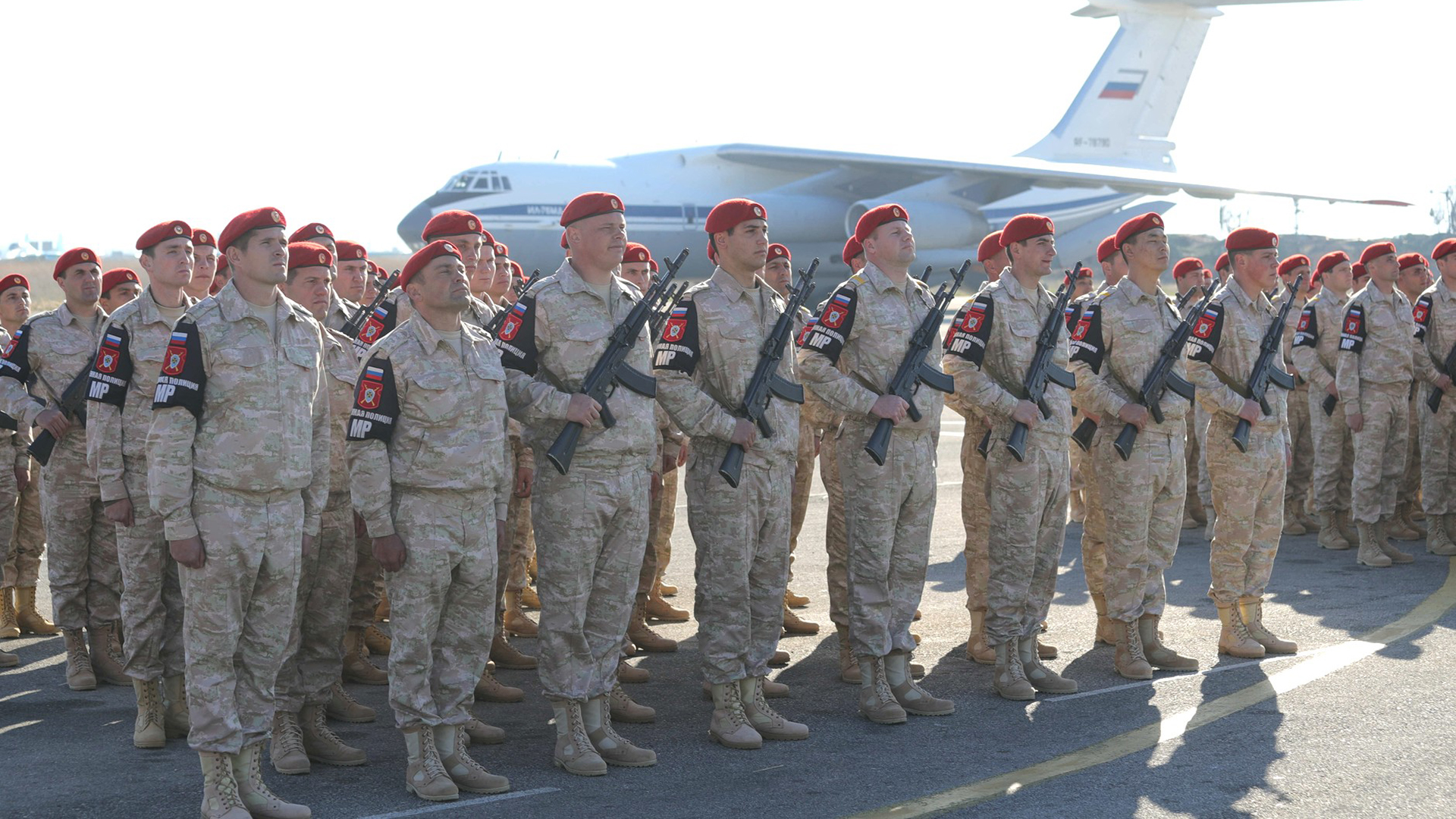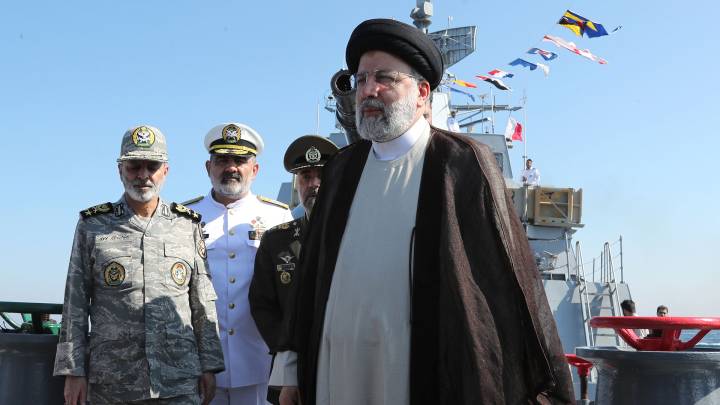While Russian-Syrian relations seem to be closer than ever, the war in Ukraine can change the strategic balance in and around Syria for good.
As soon as the Russian war on Ukraine began, Syrian President Bashar al-Assad was quick to announce his full support for Vladimir Putin. He considered the war a “correction of history” after the Soviet Union’s collapse, the subsequent disintegration of its republics and the secession of Ukraine from Russia.
While Assad’s statement seemed to have an emotional context, it was in fact an opportunity to repay the person who materially contributed to saving the regime, whether through Russia’s vetoes on several UN resolutions that might have led to an international military intervention in Syria, or through direct Russian military intervention since 2015. However, Assad’s statement can also be considered a confirmation of a political and military alliance in which Assad himself aspires to “correct history” by restoring a three decade-long alliance that existed between his father and the Soviet state.
What the Syrian opposition considers a Russian occupation of Syria is for President Assad simply a renewed alliance without any ideological background. In fact, today’s Russia is far away from socialist slogans and the image of an advocate for nations aspiring for independence and revolting against “Western imperialism.” Assad realized early on that, to Russia, the Syrian crisis is not a struggle between the forces of good and evil, but rather a case of pure self-interests.
For Putin, most of the Syrian opposition is under the influence of his opponents. The opposition has been characterized by Islamic thought since its formation, with the exception of some opposition figures who do not hold any significant weight on the ground. The Russians were well aware of the Islamists’ hatred towards them, especially by Sunnis, following the Soviet-Afghan war, the Russian-Chechen war, and Russia’s attacks on Idlib. These historical events combined with Western PR and propaganda completely succeeded in demonizing Russia throughout history, turning it into the first enemy of the Sunnis in the world.
One would therefore question the reason that might have prompted Assad to announce his support for Russia in such an extreme manner, where most world countries stood against it or at least remained neutral (as some Arab leaders did). This is especially puzzling given the difficulty of Syria providing any military support to Russia in its own war.
Aligning himself with Russia and Iran is Assad’s only way to retain legitimacy
There is a certain conviction among the Syrian leadership that the relationship between Russia and Syria is no longer just a relationship between two allies who face a common enemy, but rather that any change in the Russian government may be followed by a change of the Syrian regime. The present situation in Syria is much more fragile than that of the Soviet Union when it collapsed. At that time, President Hafez al-Assad was able to negotiate international affairs empowered by the fact that Syria was, politically, economically and internally stable. This was reinforced by its position within a good network of Arab relations, which worked to shield it from any serious attempt to overthrow the regime.
There have been talks in the past about an attempt to change the Syrian leadership while preserving the regime itself. The international community wanted to address the complex issue of the future of the presidency, thinking that it would be a good start to solve the crisis in a way that satisfies all parties by way of a new leadership. It seems that these attempts stopped due to the failure to find an alternative that would satisfy both Syrians inside the country – especially the Alawites – and the international community.
President Assad was aware of these attempts and believed that one of the goals of harsh sanctions on Syria was to escalate the resentment against his rule and against him personally. This was especially the case in the regions, cities and villages that have always been considered strongholds of his supporters, mainly in the coastal areas. The war in Ukraine was therefore an opportunity for Assad to express his support for Putin and to remind him that he is his closest and perhaps his only friend, even in Syria. The Russian president appreciated this, even more so since he seemed surprised by the severity of the global condemnation of his assault on Ukraine.
Like Putin, Assad expected the war to be over soon
President Assad is aware that Western leaders are dealing with him as the de facto ruler and not the legitimate president of the country. This position will not change any time soon. So his alignment with their opponents (Russia and Iran) is the only option that allows him to remain a “legitimate” president.
The Syrian leadership expected that the Russian military operation in Ukraine would be quick and that the Ukrainian army would rapidly collapse. The successful Russian intervention in Syria was considered a valid model for all countries and regions. They had no doubts in Putin, his “wisdom” and his decisions.
The above-stated points explain the reasons that prompted Assad to support Russia on its war. In short, even if Assad won’t gain anything from his support for Russia, he certainly has nothing to lose. Will Syrian fighters participate in the Russian-Ukrainian war? This is a question often raised by those concerned about the growing culture of Syrian mercenarism, as has been the case in Libya and the Nagorno-Karabakh region.
The participation of Syrian soldiers in the Ukrainian war alongside Russian forces is unlikely, however. It is no secret that the Syrian government has suffered from the ongoing war and, as a result, its army is almost depleted. However, the possibility of participation and recruitment of paid “volunteers” cannot be excluded. In fact, the participation of Syrian fighters in any future conflict is self-evident. It is a combination of the rampant chaos in Syria, the high rates of unemployment and poverty, the closing of migration routes, in addition to and most importantly the large number of international players controlling the Syria’s fate which will lead to Syrian fighters being present in any war that will be fought in the future. This is especially the case given the region’s propensity for conflicts, especially for sectarian ones.
The war in Ukraine, its impact on Syria and Israel
It is still too early to talk about the repercussions of this war on the political reality in Syria, as the Russian-Ukrainian war could still be in its early stages and it will likely take much longer than expected. But there are several outcomes that can be predicted in light of what has happened so far, and in light of the positions of the leaders involved in the conflict, they can be summarized as follows:
At the Russian-Syrian level, it does not seem like there will be any change in the Russian position towards Syria, since Russia is now more than ever in great need of its allies, even an ally suffering from a major political crisis, such as the Syrian regime. Nevertheless, it is an internationally recognized state and its »voice« can be used when necessary. Furthermore, Russia can still recruit volunteers to fight alongside its forces in Ukraine, and it is rumoured that several thousand have signed up so far. This number could double, triple or even quadruple if necessary to reduce Russia’s human loss and to prevent provoking an internal crisis in Russia if the battles continue to escalate.
Perhaps the most expected change will be in the Russian-Israeli relationship, which has begun to witness increasing tension despite Israeli leaders’ attempts to keep good relations with Russia. But the statements of Israeli officials calling the war a Russian invasion and stressing Israel’s duty to provide assistance to Ukrainians strongly affected the Russian-Israeli relations. This might lead to new developments in which Russia reconsiders its position and stops restraining the Syrian army from a violent retaliation for the continuous Israeli raids on Syrian territory. This has become a major embarrassment domestically for the Syrian government in light of the escalating death toll among Syrian soldiers and the growing discontent over the weak and unbalanced defense policy pursued by Damascus.
The Russians can initiate one of two scenarios on that front: Using the weapons that Russia was said to have delivered to Syria, including the S-300 system, whenever Russia gives green light to use them to confront Israeli warplanes, in order to limit the Israelis’ air movement. Or, Russia considers the previous Russian-Israeli agreement on the rules of engagement in Syria invalid and takes upon itself the protection of the Syrian air space, which could result in a Russian-Israeli clash that both sides have long sought to avoid. This may contribute to launching a more rapid armament movement in favor of the “resistance” in Lebanon, especially precision-guided weapons, which Israel claims to be at the top of its military targets.
At the Syrian-US and European levels: Although the US has not announced any direct consequences against the Syrian regime for its pro-Russian stance in the war, such as providing the Syrian opposition with heavy weapons or discussing a no-fly zone over northern Syria, indirect positions have begun to emerge from their closest ally, the Kurdish-dominated forces of the so-called Autonomous Administration. A sense of arrogance among the Kurdish fighting factions has become more noticeable than before. This prompted them to besiege the areas under Syrian government control in Qamishli and cut off food, water and electricity supplies under the guise of various excuses. This looks like a form of assertion of strength, whereas the Syrian regime’s reaction was limited to the condemnation of this siege, which ended a few days later after Russian mediation.
Besieged regimes can be stable but more vulnerable to sudden events
The end of the siege might have restored food, electricity and water but it certainly will not restore trust. Rather, this standoff will exacerbate the resentment against the Kurdish authorities, who feel empowered by US officials who have promised that American forces will not withdraw from SDF-controlled areas and abandon them.
As for the Europeans, perhaps their most significant reaction is the decline of interest in the Syrian matter and the total focus on the Russian-Ukrainian war, because of its serious repercussions in Europe on several levels, especially security and economy. It seems that this decline of interest is a welcome reaction for the Syrian regime, especially given its perpetual condemnation by European leaders. For Damascus, it is always favorable when not too much attention is devoted to the Syrian file.
But history has taught us Syrians, alongside other countries that have been subjected to long-term sanctions, that unchanging positions can nonetheless continue to be accepted in the game of regional balances. Unexpected events, however, should be taken into account, as they can influence or change positions suddenly and can produce extreme reactions which may threaten the existence of the entire regime.
Iraq and Libya can serve as the best examples of what such an “unexpected event” can lead to after a long period of stagnation. Both countries were isolated and besieged for many years without this leading to total regime collapse in spite of the great economic pressure they faced. It was only the occurrence of the respective game-changing events that resulted in the overthrow of both regimes. For Iraq, this was 9/11 and for Libya the internal revolution that led to Gaddafi’s overthrow. Could it now be that the Russian-Ukrainian war is this game-changing event that could be used, in the right context, to reconsider the nature of the relationship with the Syrian regime?
Will Russia be hit in Syria as part of the global confrontation?
To make the question clearer: What will be the fate of Syria’s internal and external contradictions if the Russian war on Ukraine gets worse? It is clear from the context of the war and the massive flow of weapons to Ukraine that the war will last longer than expected, and that there is a clearly declared US effort to inflict heavy losses on Russia. Moreover, the sanctions on major economic entities and pro-Putin Russian oligarchs contribute to the implosion of the domestic Russian system of power, which had thus far been coherent and in support of Putin in his Ukrainian war.
The question now is whether the US-European confrontation with Russia will be limited to Ukrainian soil or one day extend to Russia’s assets in the world, especially the areas hosting Russian military bases, such as Syria. Or will Russia’s opponents prefer to maintain the very fragile stability that currently exists? This question cannot be answered at present, but it is certainly possible to imagine the consequences of such a change of the current rules of engagement. What is certain is that Syria’s internal tensions continue to exist and that any domestic power imbalance in Syria can lead to cycles of violence and chaos, not only in Syria but extending to Lebanon.
Furthermore, the international consensus that established this fragile stability in Syria was violently shaken by the Russian-Ukrainian war, but its political repercussions have not yet materialized.




